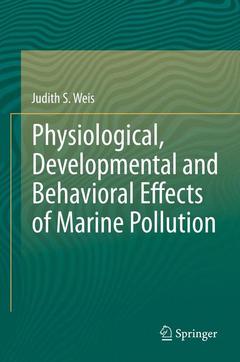Description
Physiological, Developmental and Behavioral Effects of Marine Pollution, 2014
Author: Weis Judith S
Language: English
Approximative price 105.49 €
In Print (Delivery period: 15 days).
Add to cartPublication date: 02-2015
454 p. · 15.5x23.5 cm · Paperback
Approximative price 105.49 €
In Print (Delivery period: 15 days).
Add to cartPublication date: 08-2013
454 p. · 15.5x23.5 cm · Hardback
Description
/li>Contents
/li>Biography
/li>Comment
/li>
PART I. PHYSIOLOGY
1. Introduction
2. Feeding and Digestion
3. Respiration
4. Osmoregulation and Excretion
PART II: REPRODUCTION AND DEVELOPMENT
5. Reproduction
6. Embryonic Development
7. Larval Development
8. Developmental Processes Later in Life
PART III: BEHAVIOR
9. Behavior
PART IV: COPING WITH POLLUTANTS
10. Bioaccumulation/Storage/Detoxification
11. ToleranceEmphasizes organism level responses to marine pollutants including, in addition to traditional metal and organic pollutants, ocean acidification, hypoxia due to nutrient pollution, and contaminants of emerging concern
Gives attention to responses that have a logical connection to ecological effects
Includes supplementary material: sn.pub/extras




